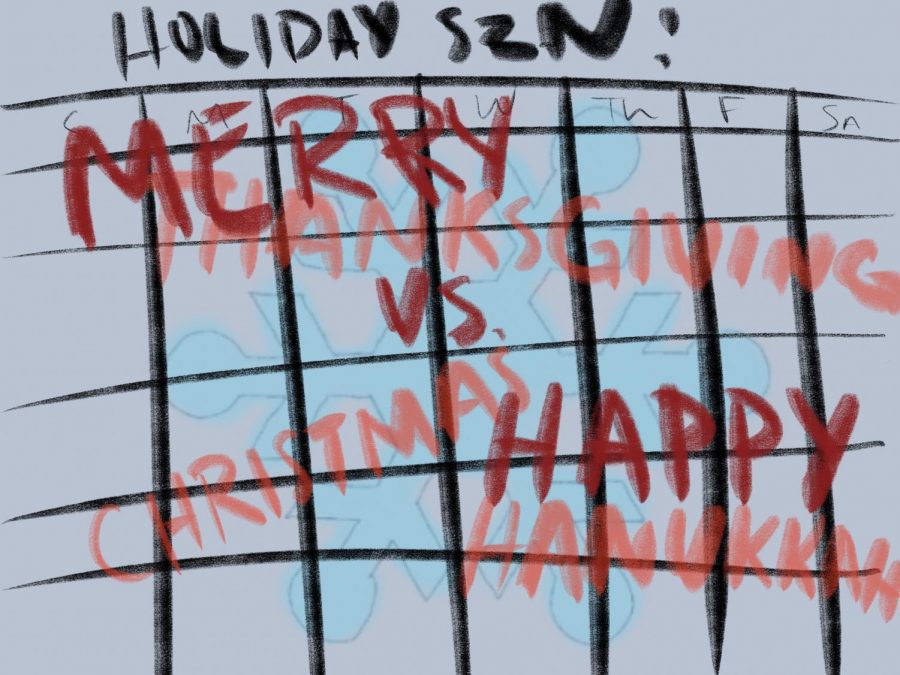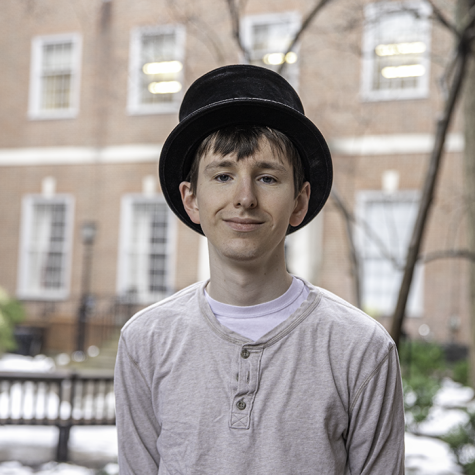Opinion: Christmas is a lexical glutton
All holidays are not created equal, and this inequality has been compounded by our very vocabulary. This Christmas season, let us right this wrong.
There are other adjectives we can use to celebrate holidays — not just “merry” Christmas. (Staff Illustration by Manasa Gudavalli)
December 3, 2021
Imagine, if you will, that you’re visiting your significant other’s family for Thanksgiving. Before you even knock, the patriarch throws the door open and offers you a hearty greeting. Caught off guard, you respond with “merry Thanksgiving!” The resulting silence is deep enough to sink the Titanic — and that’s just the start of your worries. Soon afterwards, your would-be in-laws disown you, your fiancé disavows you, and the stock value of Webster’s Dictionary plummets, collapsing the economy of the entire English-speaking world. All this because you misapplied an adjective? How did we get here?
“Merry” is a word like any other, but its usage is almost monopolistically tied to Christmas — as is the word “festive,” albeit to a lesser extent. Meanwhile, nearly the entire body of American holidays must make do with “happy” in their salutations: “Happy New Year’s Day,” “happy Hanukkah,” “happy Fourth of July,” “happy Halloween” and “happy holidays.” Even “happy Christmas” is recognized by many as legitimate. Why has society allowed this glaring adjectival inequality between Christmas and non-Christmas to persist?
In any situation such as this, we must ask ourselves — in Latin, of course — cui bono? The culprits are obvious. Merchandising corporations save millions of dollars on icing, molds and printing presses by reusing the same five-letter word for every major non-Christmas holiday. In fact, the craftier manufacturers have probably found ways to capitalize on the fact that the “p” is repeated in “happy,” meaning they only need to produce four different letters. This same cash-saving connivance is seen in the double “r” of “merry.” Nonetheless, it receives a degree of exceptionality by being paired solely with Christmas, while every other holiday is saddled with “happy.”
It’s not surprising that Christmas gets all the special treatment of unique adjectives. The perversion of Christ’s birth for financial gain has become typical practice in the United States — from endless festivities, traditions and songs that appear on the radio earlier and earlier each year, Christmas is shoved down our throats. Not to mention the trees, lights, stockings and presents that need to be purchased in order to conform to the so-called spirit of the holiday season.
Of course, blame should fall not only on the capitalist element, but also on the Christian element. For all of Jesus’ teachings about equality, his disciples seem to be awfully content with having a lexical edge over the competition. By being the only mainstream holiday that gets its own adjective, Christmas demonstrates the hegemony of Christianity within the United States — a hegemony which disenfranchises members of other faiths, whose holidays are left with semantic scraps. The fact that this nation was ostensibly founded on the principles of cultural inclusion and separation of church and state makes it particularly jarring that Christian supremacy seems to have been codified into our very vernacular.
What would our world look like if this injustice was corrected? As we have established, Big Holiday presumably thrives off of reproducing the same adjective over and over again. Allowing other holidays to have the privilege of a reserved adjective would shatter this monopolistic practice. New equipment would need to be purchased to produce each adjective, which would create jobs and stimulate the economy. It would also allow small businesses to specialize in specific holiday adjectives, diversifying the market and preventing any one manufacturer from cornering the market like they have on “happy.” This is to say nothing of the linguistic benefits. Underappreciated words could find new life through association with holidays. We could live in a society that wishes us a “gorgeous Valentine’s Day,” a “spooky Halloween” and an “empyrean Easter.” Such a culture would give rise to more tolerance and experimentation within the English language. We could see obscure or stigmatized words such as “cognoscente,” “obeisance,” “mesomorphic” and “flaccid” become pillars of a new, contemporary lexicon.
The homogeneity of adjectives used to celebrate holidays prevents us from embracing the multiculturalism of our society. It suppresses lexical creativity and diversity in order to maintain an unimaginative status quo. It’s time that we, as practitioners of language, expand our horizons and break from tradition. After all, moving away from how it’s always been done and embracing new ideas is how society progresses. Nothing about our holidays is fixed — Christ wasn’t even born in December!
As Ludwig Wittgenstein once said, “the limits of my language mean the limits of my world.” So what kind of world do we want to live in? One where we settle for mediocrity by only letting Christmas have diverse adjectives? Or one where all holidays share equally in the spoils of the English dictionary?
Contact Max Tiefer at [email protected] and Lorraine Olaya at [email protected].





























































































































































